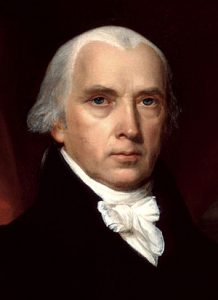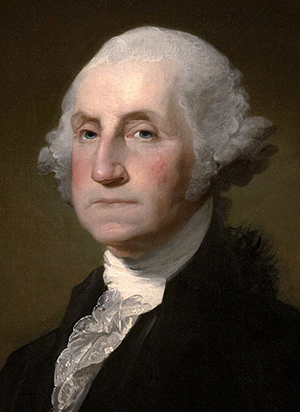The Founders on Immigration
Immigration, and who comes into our country, has obviously become an incredibly pertinent subject the last few years, and even more so in the last few days. What did the Founders have to say about it? As it turns out, quite a bit. Throughout their comments can be discerned one consistent thread: those that come to this country must share our values, fully support our unique and exceptional institutions, and immigration policy should be dictated by the interests of those who already live here.
For example, to Vice President John Adams, President George Washington observed as follows:
George Washington – Wikimedia Commons
[T]he policy or advantage of [immigration] taking place in a body (I mean the settling of them in a body) may be much questioned; for, by so doing, they retain the language, habits, and principles (good or bad) which they bring with them. Whereas by an intermixture with our people, they, or their descendants, get assimilated to our customs, measures, and laws: in a word, soon become one people.[1]
In his Notes on the State of Virginia, Thomas Jefferson remarked:
Every species of government has its specific principles. Ours perhaps are more peculiar than those of any other in the universe. It is a composition of the freest principles of the English constitution, with others derived from natural right and natural reason.[2]
He continued:
Thomas Jefferson – Wikimedia Commons
[N]othing can be more opposed [to American principles] than the maxims of absolute monarchies. Yet, from such, we are to expect the greater number of emigrants. They will bring with them the principles of the governments they leave, imbibed in their early youth; or, if able to throw them off, it will be in exchange for an unbounded licentiousness, passing, as is usual, from one extreme to another. It would be a miracle were they to stop precisely at the point of temperate liberty. These principles, with their language, they will transmit to their children. In proportion to their numbers, they will share with us the legislation. They will infuse into it their spirit, warp and bias its direction, and render it a heterogenous, incoherent, distracted mass.[3]
In the Constitutional Convention of 1787, James Madison, often touted as the “Father of the Constitution,” expressed his own desire, with respect to immigration, to “maintain the character of liberality which had been professed in all the constitutions and publications of America. He wished to invite foreigners of merit and republican principles among us.”[4] [Emphasis added]

James Madison – Wikimedia Commons
In the debates in the House of Representatives over the country’s first immigration bill, Madison asserted his belief that the purpose of immigration was to serve the interests of those citizens already here:
When we are considering the advantages that may result from an easy mode of naturalization, we ought also to consider the cautions necessary to guard against abuses. It is no doubt very desirable that we should hold out as many inducements as possible for the worthy part of mankind to come and settle amongst us, and throw their fortunes into a common lot with ours. But why is this desirable? Not merely to swell the catalogue of people. No, sir, it is to increase the wealth and strength of the community; and those who acquire the rights of citizenship without adding to the strength or wealth of the community are not the people we are in want of … I should be exceedingly sorry, sir, that our rule of naturalization excluded a single person of good fame that really meant to incorporate himself into our society; on the other hand, I do not wish that any man should acquire the privilege, but such as would be a real addition to the wealth or strength of the United States. [5]
In a later debate in the House on the same topic, he rhetorically asked:
What can be more reasonable than that when crowds of them [immigrants] come here, they should be forced to renounce everything contrary to the spirit of the Constitution[?][6]

Alexander Hamilton – Wikimedia Commons
In a series of essays published in 1802, Alexander Hamilton made his ideas with respect to immigration perfectly clear:
The safety of a republic depends essentially on the energy of a common national sentiment; on a uniformity of principles and habits; on the exemption of the citizens from foreign bias and prejudice, and on the love of country which will almost invariably be found to be closely connected with birth, education, and family. The opinion advanced in Notes on Virginia [by Thomas Jefferson] is undoubtedly correct, that foreigners will generally be apt to bring with them attachments to the persons they have left behind; to the country of their nativity, and to its particular customs and manners. They will also entertain opinions on government congenial with those under which they have lived; or, if they should be led hither from a preference to ours, how extremely unlikely is it that they will bring with them that temperate love of liberty, so essential to real republicanism?[7]
In another one of the essays, he continued this line of thought:
In the recommendation to admit indiscriminately foreign emigrants of every description to the privileges of American citizens on their first entrance into our country, there is an attempt to break down every pale which has been erected for the preservation of a national spirit and a national character; and to let in the most powerful means of perverting and corrupting both the one and the other.[8]
He went even further and compared such lax immigration policies with the Trojan horse:
To admit foreigners indiscriminately to the rights of citizens the moment they put foot in our country would be nothing less than to admit the Grecian horse into the citadel of our liberty and sovereignty.[9]
Hamilton concluded his thoughts by appealing to the same principle as Madison — that immigration laws should be geared toward the benefit of the citizens of the United States who are already here, and only those who supported and believed in American institutions should be admitted:
[T]here is a wide difference between closing the door altogether and throwing it entirely open; between a postponement of fourteen years and an immediate admission to all the rights of citizenship. Some reasonable term ought to be allowed to enable aliens to get rid of foreign and acquire American attachments; to learn the principles and imbibe the spirit of our government; and to admit of at least a probability of their feeling a real interest in our affairs.[10]

Joseph Story – Wikimedia Commons
In conclusion, the following commentary was offered by Justice Joseph Story, who wrote the most widely read and respected commentary on the Constitution of the 19th century. With respect to Congress’ power to create a uniform law of naturalization, he observed:
It is of the deepest interest to the whole Union to know, who are entitled to enjoy the rights of citizens in each state, since they thereby, in effect, become entitled to the rights of citizens in all the states. If aliens might be admitted indiscriminately to enjoy all the rights of citizens at the will of a single state, the Union might itself be endangered by an influx of foreigners, hostile to its institutions, ignorant of its powers, and incapable of a due estimate of its privileges.[11]
Such were the beliefs of the Founders.
[1]George Washington, Letter to John Adams (November 15, 1794).
[2]Thomas Jefferson, Notes on the State of Virginia, Query 8(1783).
[3]Ibid.
[4]James Madison, Records of the Federal Convention of 1787 (August 13, 1787);James Madison, Notes of Debates in the Federal Convention of 1787, Reported by James Madison (Athens, OH: Ohio University Press, 1985), 438.
[5]James Madison, House of Representatives, Rule of Naturalization (February 3-4, 1790); Philip B. Kurland and Ralph Lerner, eds., The Founders’ Constitution, Volume Two: Preamble through Article I, Section 8, Clause 4 (Indianapolis: Liberty Fund, 2000), 562.
[6]James Madison, House of Representatives, Naturalization Bills (January 1, 1795); Philip B. Kurland and Ralph Lerner, eds., The Founders’ Constitution, Volume Two: Preamble through Article I, Section 8, Clause 4 (Indianapolis: Liberty Fund, 2000), 577.
[7]Alexander Hamilton, The Examination, No. 8 (January 12, 1802).
[8]Alexander Hamilton, The Examination, No. 9 (January 18, 1802).
[9]Ibid.
[10]Alexander Hamilton, The Examination, No. 8 (January 1802).
[11]Joseph Story, Commentaries on the Constitution, Book 3, §1098 (1833); Philip B. Kurland and Ralph Lerner, eds., The Founders’ Constitution, Volume Two: Preamble through Article I, Section 8, Clause 4 (Indianapolis: Liberty Fund, 2000), 619.









